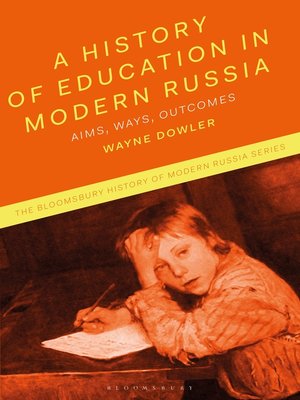A History of Education in Modern Russia
ebook ∣ Aims, Ways, Outcomes · The Bloomsbury History of Modern Russia Series
By Wayne Dowler

Sign up to save your library
With an OverDrive account, you can save your favorite libraries for at-a-glance information about availability. Find out more about OverDrive accounts.
Find this title in Libby, the library reading app by OverDrive.



Search for a digital library with this title
Title found at these libraries:
| Library Name | Distance |
|---|---|
| Loading... |
A History of Education in Modern Russia is the first book to trace the significance of education in Russia from Peter the Great's reign all the way through to Vladimir Putin and the present day.
Individual chapters open with an overview of the political, social, diplomatic and cultural environment of the period in order to orient the reader. Dowler then goes on to analyse the aims of education initiatives in each era before considering the ways in which Russians experienced education, both as students and as teachers. Each chapter concludes with an assessment of the outcomes and consequences of education policies in the period, both the successes and failures as well as the impact of education on the cultural, social, economic and ultimately political environments. The chronologically arranged book also traces and then summarises underlying key themes like the tension between an open system of education and an estate-based system; the push and pull between utility and the broader goal of human development; and the effects of centralized, authoritarian control that for much of the period limited local initiative and starved the regions of adequate resources.
Individual chapters open with an overview of the political, social, diplomatic and cultural environment of the period in order to orient the reader. Dowler then goes on to analyse the aims of education initiatives in each era before considering the ways in which Russians experienced education, both as students and as teachers. Each chapter concludes with an assessment of the outcomes and consequences of education policies in the period, both the successes and failures as well as the impact of education on the cultural, social, economic and ultimately political environments. The chronologically arranged book also traces and then summarises underlying key themes like the tension between an open system of education and an estate-based system; the push and pull between utility and the broader goal of human development; and the effects of centralized, authoritarian control that for much of the period limited local initiative and starved the regions of adequate resources.







